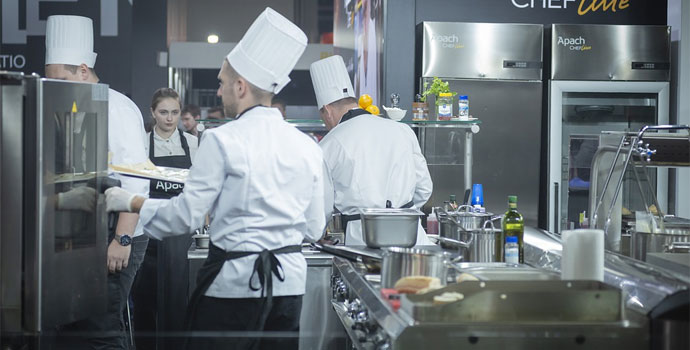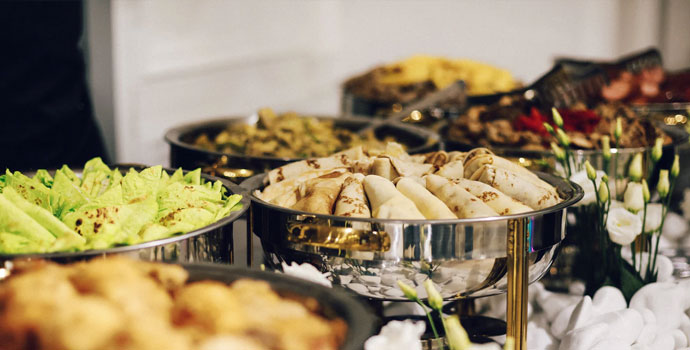If your home-cooked meals are a hit with your family and friends, you may have wondered if you can start a home-based catering business.
- Inbox Dollars - Get paid to check your email. $5 bonus just for signing up!
- Survey Junkie - The #1 survey site that doesn't suck. Short surveys, high payouts, simply the best.
- Nielsen - Download their app and get paid $50!
Wouldn’t it be nice if you can turn your love for good food and cooking into a nice little income or even into a catering business?
Today’s article is a guide on how to start a catering business from home: how to decide if it’s right for you, everything you need to start, and how to establish your business.
Should You Start A Catering Business?
A catering business involves preparing and providing food at events, parties, and other large gatherings.
It’s very different from preparing food for your family for the holidays and simple get-togethers with friends.
Here are some of the most important factors to consider before you start your catering business.
Laws
First, find out if your state allows a home-based cooking business. Aside from state laws, individual cities and counties may have stipulations on such businesses, and zoning laws may not allow you to operate from home.
Thus, before you even decide to do it, be sure to check all of the food regulations applicable in your area.
Facilities
If your state is able to give an in-home catering business license, it comes with very strict requirements, as everything food-related should be.
In general, the kitchen where the food for catering is prepared should be separate from all living areas by a door.
Plus, all storage areas (i.e., freezer and refrigerator), utilities, and ingredients used to prepare food for catering must be completely separate from those used to prepare food for those who are living in the home.
Investment
In terms of food businesses, a catering business costs less than a restaurant in terms of initial investment, but you’ll still need at least some initial equipment to get started.
Take inventory of the equipment and cookware you may already have and canvass the best deals for the equipment you’ll need to get started.
If you don’t have enough cash, maybe it’s not yet the right time to start your catering business. If you want, you might like to try online jobs that don’t require an investment first so you can save up for capital.
Keep in mind, though, that a catering business can net you between $30,000 and $80,000 a year, depending on costs and how large the catering jobs are.
Business goals
The good thing about a catering business from home is that you can choose to grow your business to cater to bigger events or you can keep your business small and manageable and earn a constant income.
Figure out what opening this business will help you achieve so you can keep your eyes on the goal.
Ideal customer
No joke. Here are the fastest ways to make easy money online. Click here to see how.
You’ll want to have an idea of the type of customer that you want to serve food to.
When you have a profile of your ideal customer, you can then weigh your culinary skills to meet your target customers’ needs.
It is particularly important in the food business to please your customers because a single meal can make or break your reputation as a caterer.
Steps to Take to Start A Home Catering Business
Are you now absolutely, 100% sure that you want to do this?
If yes, then here’s what you need to put together before you start your catering business from home.
A Niche
All businesses have to have their own niches to capture.
But finding your niche is especially important in a home-based catering business because keeping your marketing focused and costs low is a priority for start-ups.
Narrow your focus on a particular cuisine and/or certain kinds of events.
For example, if you’re an expert in grilling, you can specialize in barbecue catering. That way, you have a clear marketing focus on a target market, plus you can focus on buying equipment centered around grilling and not much else.
Other niche ideas are cocktail party catering, kosher catering, and brunch catering.
You can also specialize in special diets: vegetarian, vegan, gluten-free, nut-free cuisines are increasingly in demand.
Market Research
A catering business can certainly be profitable, and you’ll want to find out everything you can about the niche that you want to target to make sure you’re competitive and meet their needs.
Market research is the process of gathering data about a target market’s needs, triggers, and preferences, and analyzing this data so you can figure out who to offer your catering services to, what you can offer them, and how to offer your services to them.
We’ve covered the details of doing market research in a previous article.
A Business Plan
A clear plan is critical to the success of your catering business.
The basic points to consider are your target market, your financials, and your overall goals.
We go into the details of creating a business plan in another article on our site (plus, you get to learn about another business idea from home).
The Right Equipment
The niche you select will have plenty to do with the equipment you’re going to purchase for your catering business.
You can make money from home and it doesn't have to be challenging. Click here to see how.
First, you’d need kitchen equipment, which includes cookware, chef knives, and food preparation equipment such as a peeler, a blender, and a food processor.
You’d also have to get food storage equipment, like a large refrigerator and upright freezer.
Next, you’d want to have your stoves, grill, oven, sandwich maker, microwave, and any other implements to cook your food.
Also, you’d want to have disposable materials that are crucial for food safety, such as food-safety gloves, mouth shields, aprons, and hairnets.
You’d also need dedicated cleaning supplies for your work area and surfaces where you prepare food: cleaning and disinfecting solution, mops, cleaning cloths, scrub brushes, and sponges.
Servingware, where you plate and present the food you prepared, is another important equipment to get; presentation is a big part of the appeal of food.
Serving supplies such as china, glassware, utensils, linens, tables, and chairs can be rented if you want to keep costs down to a minimum, but you can certainly purchase these later.
Food containers are necessary as well for transport to and from your kitchen to the venue.
Lastly, you’d need food transportation equipment, such as a van or a small truck and food cabinets for hot food and coolers for cold food so you can keep the food temperature constant before serving.
State-Mandated Training
To be clear, you can be a caterer whether or not you have a diploma or even have gone to culinary school.
But you do have to take up mandatory food-handling courses provided by your state.
These are series of courses of four to eight mini-courses that instruct about how to store food properly, heating and cooling requirements, correct sanitation methods, and other specific requirements of the state.
Other Training
Just because you’re running a catering business doesn’t mean you’ll be dealing with food all of the time.
You’ll also be dealing with customers, suppliers, and employees, if you decide to hire people down the line.
Learning administrative, managerial, and customer service skills before you officially start your catering business would be a great help to your success.
Experience
It’s going to be more advantageous for you to work in a restaurant or any other food-business for a few weeks or months before you start your catering business.
But if your schedule or anything else doesn’t permit you to, at least cook some sample dishes for your friends and family and ask them for their honest feedback.
Network
Attend trade fairs to meet caterers and restaurant owners as well as suppliers of equipment and ingredients.
Also, you can join local or state associations of caterers and restaurant owners so you can get updated about your competitors and the latest trends in the industry.
Workspace
At this point, you should be sure you know what the state and city requirements are for your kitchen space, so before you even apply for your first license, you need to configure your workspace so that you meet all the requirements for a license.
How To Start A Catering Business From Home
So you’ve decided that you want to open this business, and you’ve prepared all you need to prepare.
Here’s how to start a catering business from home.
1. Obtain all the necessary licenses and permits.
Your catering business must be licensed as a Food Service Establishment, which your local health department provides.
Before you can acquire your license, a compliance officer needs to inspect your workspace and kitchen to determine if it meets all the necessary requirements.
Also, if you intend to serve alcohol, either with your meals or by offering bar service, you’ll need a liquor license as well, so keep that in mind when you’re preparing requirements for your license.
If you plan to hire employees in the future, you also need to make sure that you meet Occupational Safety and Health Administration (OSHA) requirements.
2. Register your catering business.
It is recommended that you register your company as a limited liability company (LLC) to separate your business finances from your personal finances.
You’ll want to protect your personal assets from liability in case your catering business gets involved in debt or litigation, so it’s also advisable to open separate bank accounts and credit cards for your business
.
3. Organize your business financials.
Once you’re registered as an LLC, you can open a separate business bank account and credit card, which not only asserts the separation of your business and personal finances but also establishes a credit line for your business that you can utilize when you’re in a tight spot or when you decide you want to expand the business.
Aside from separate bank accounts, you want your business books and personal books to be separate as well. Set up an accounting record of your business as soon as you get your LLC status.
You’ll also need to register to the IRS to be able to pay state and federal taxes, as well as to be eligible for tax breaks.
Another thing you’ll have to register for is insurance: general liability to be covered against bodily injury, property damage, and personal injury, commercial auto insurance, and workers comp if you decide to hire employees at some point.
4. Create your catering menu.
You can offer buffet-style dining or a sit-down plate service, depending on your niche as well as your clients’ preferences.
The best way to offer dishes is to create catering menus that clients can easily choose from as well as customize.
When building a catering menu, you need to take into account the cost per plate (i.e., total food cost divided by total number of guests), labor hours, materials cost, and how much profit you can reasonably tack on (around 10% to 12% of total costs, not just food costs).
Pricing can be a delicate art, and you might not get it right the first few times, and that’s why you need to compare your prices with local competitors to make sure you’re not being overly aggressive or you’re not undercutting yourself.
5. Set up your calendar.
A perk of running a catering business from home is that you get the flexibility to decide what days of the week you want to cater, as well as which hours of the day.
You can target the busiest period for your niche and work as frequently as you can and then take a rest during nonpeak, or you can continue catering for another niche.
For instance, if you’re targeting weddings or wedding-related gatherings (e.g., engagement parties, rehearsal dinners, stag or hen parties, etc.), the wedding season is considered to be May to October in a year.
6. Establish your online presence.
Yes, catering is more of personal business, but before anyone books your service, they’ll research about you, and one of the first places they’ll go to is on the internet.
Start by getting on social media. Facebook is good for targeted advertising, while Instagram is good for showing off high-quality photos of your food.
Social media marketing is important, but aim to launch your own website at the same time as your social media or at least soon.
Aim to create a website where customers can reserve a date and even pay a reservation fee through various channels.
But even if you don’t end up having this feature, merely having a website is a big marketing and promotional opportunity for your catering business.
7. Organize your contact information.
Just like you want your business finances separate from your personal finances, you’ll want your business contact information separate from that of your personal contact information as much as you can.
It’s a little bit tricky because you’re working from home, and technically you can have your home address listed as your business address if you’re registered as an LLC.
The problem with this is that business addresses, called Registered Agent addresses for LLCs, are public record, and if your home address is made public, you’ll tend to receive plenty of junk mail or maybe even have unwanted visitors.
To keep your home address private, you can either get a mailbox through UPS or look for a co-working space that offers the use of a street address as a mailing address.
Another contact information you have to take care of is a dedicated business phone line. This is easier to take care of than getting a street address.
You’d want a business phone that you can turn off during your non-work hours as well as a smartphone by which you can post and update your social media.
A separate business email is also advisable, although that should be taken care of if you set up your own website.
Starting A Catering Business From Home: Additional Tips
To be a go-to caterer, you’ll need to be reliable, punctual, trustworthiness, value for money, variety of food, professionalism, and proper decorum, especially for formal events.
Of course, there is no guarantee that any home-based catering business will be successful, but culinary skills, passion, and determination will go a long way.
Maybe all this post achieved was to convince you that starting a business isn’t for you, but that you’d like to work from home. Here is a list of jobs that you can work from home.
Are you thinking of starting your own catering business from home? Did my article inspire you to give it a go? Tell us your stories in the comments below!










I am currently in the process of starting a food business from home. Takeaways only for now, and though I hadn’t thought of catering, your blog has given me some new ideas for future expansion into catering.
Thank you so much, Steve!
Hi Steve,
Such a great post man. It’s a dream Catering Business for many people, even I am thinking of starting one, but can’t make any decision right away, but your blog has helped me a lot.